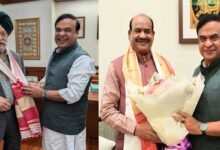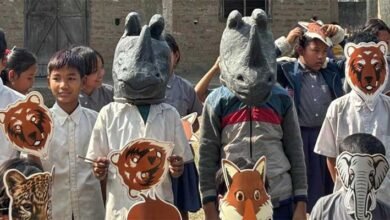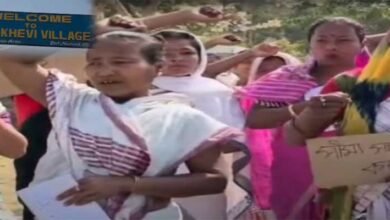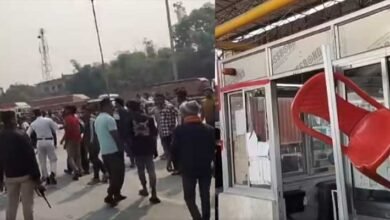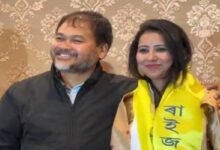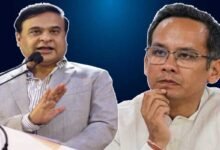Assam: 17th Dr Amitabh Chowdhury Annual Memorial Lecture held
“India’s second republic: The collapse of liberal constitutionalism.” By Dr Pratap Bhanu Mehta

Guwahati: The 17th Dr. Amitabh Chowdhury Annual Memorial Lecture was delivered on the 19th of December, 2020 by Prof (Dr) Pratap Bhanu Mehta, Former Vice Chancellor Ashoka University and contributing Editor of the Indian Express on “India’s Second Republic: The collapse of liberal constitutionalism”.
Owing to the on-going pandemic, this year the, the Dr Amitabh Chowdhury Memorial Trust televised the Lecture.
Addressing the Lecture, Dr. Mehta described Dr. Chowdhury as “an exceptional human being who embodied extraordinary intelligence, humanitarian values, a generosity of spirit and as his sister Barnali has described it, a spirit of sweetness and light”. Elaborating on the theme of his Lecture, Prof. Mehta started by saying that “My topic is not a cheery one, it is about the collapse of liberal constitutionalism in India and what it means for the future of our Republic. Liberal constitutionalism in India has always been considered something that lives on fragile ground – a top soil with shallow roots. But for all of India’s problems, the progressive pathway laid down by our Constitution was clear to most of its citizens. It was to emancipate individuals, to endow them with the maximum freedom possible compatible with the similar freedom for others; to provide the material basis for social self-respect and to create a new form of solidarity based in human fraternity. With the political developments and the constitutional developments of the last few years, have in some senses for the first time since independence, in a serious sense (1975 of course was another occasion) but for the first time since independence there is now a serious question-mark over the viability of this project. And the constitutional developments around us signal a near collapse of this project. And it is this collapse that I want to reflect on and outline today”.
Prof. Mehta said that “in 1950, India’s Constitution gave India a new identity in old civilization forming itself on the basis of a new social contract. The Preamble to the Indian Constitution, which many citizens have been reading over the course of the last year, is an extraordinary spare and elegant Preamble and you know what makes it spare and elegant is the fact that it does not burden citizens with either God, history or identity. Its pulsating heart and unredeemed promise is liberty, equality, fraternity and justice. Unlike the Preambles of many Constitutions that will begin with reference to God, that will begin with reference to a particular historical identity, burdening you with the weight of the past, Our Constitution was meant to set us free. This is not because God is not important or may not be important for people; this is not because we don’t have identities; this is not because we don’t have a rich and deep history, but the Constitution’s beauty was to say – new India is free to imagine God, history and identity in whichever way it chooses. It actually took these things so seriously that in a sense it guaranteed all the freedoms that made the imagining of these identities possible. Like a little stroth, the Preamble lets you concentrate on the basics, liberty for what, equality of what and fraternity between who – the three basic questions of constitutionalism – and it says that the answer to any one of these questions depends on the answer to the others. One concept, liberty cannot be operational without equality and neither can be operational without fraternity. The other thing you might notice about the Constitution and I think something a person like Dr. Amitabh Chowdhury would have genuinely cared about is that apart from references to justice and the unity of the Nation, the references in the Preamble are all to the dignity of the individual. This is in very radical idea in the Indian context. Our discourse on communal solidarity in these troubled times often invokes the idea of solidarity between groups across different identity – religious, caste or so forth. But the Preamble to the Indian Constitution was referring to something more radical, the unity of a Nation is not simply the solidarity of groups – it is based on a real and much deeper unity that is possible only when the dignity of every single individual is assured. The preamble was saying to us, if you honour the freedom and dignity of every individual, the Nation has nothing to fear – automatically it becomes united. So the Preamble to our Constitution was a charter of liberation centered on the dignity of the individual. It envisaged a unity but it was not the unity of sameness – it was the unity of something more difficult – it was the unity of reciprocity that we care for each other – not that we are the same of honouring as it were our mutual obligations to each other not collapsing us into the same identity. And it is this project, I would like to humbly submit, that is all but collapsing before our eyes. Why do I say this? Again to put the matter a little bit bluntly – these are important matters one can be graceful about them but when important matters are at stake, perhaps one can take a few liberties and be a little graceless. India is fast moving towards becoming a Hindu majoritarian nation. This claim, you might say, of an ethnocracy is being inscribed in our politics in more ways than one can list”.
Prof Mehta during the course of his Lecture stated that “The identity of the Nation is being defined in Hindu terms – Jawahar Lal Nehru remembered and defined India as a palimpsest on which every civilization has written its history. India is a Hindu country, Muslim country, Christian Parsi country, Sikh country; India is an Asian power; the Indian Constitution represents the best of the European enlightenment. Its greatness – what made it an extraordinarily unique political experiment in the world was the fact that it took everything in the world and made it its own. This idea of India as a palimpsest – no longer commands political credibility, instead of this palimpsest in which the whole world can find its place. We talk of Vasudev Kutumbakam a lot but India was actually the Vasudev Kutumbakam in that literal sense. The one nation in the world on whom every civilization, in a sense, had inscribed its mark. This is no longer a source of pride for us – this is a source of embarrassment – this is a source of fear – this is a source of conflict”.
Referring to the law on ‘love jihad’ promulgated recently by the Uttar Pradesh Government, Prof Mehta stated thus :
“We have a new law in the State of Uttar Pradesh – without embarrassment we called the Love Jihad Law. This law is a double travesty on our Constitution. It denies in some significant sense the freedom of religion and it says to every ordinary citizen even an act of love has to be authorised and stamped by a State through its communal prism. I hope the Supreme Court strikes it down but the law exists”.
Prof Mehta referred to the ten markers – of growing authoritarianism in India i.e the use of what we, in political scientist call “ethnic dog whistles”, dissent is treason, control of the information order, ruling dispensations everywhere, empowering vigilantes to either take the law into their own hands or to, in some senses, perform the function of law, making citizens more transparent to the State but making the State more opaque to the individuals.
Prof Mehta in his lecture said that the Right to Information Act is a historic piece of legislation; that for the first time empowered the citizenry to ask questions of government in a way which was not possible which has now been slowly and quietly gutted.
Referring to the role of the Judiciary, Prof Mehta stated that :
“Take the judiciary for example – an extraordinary Institution that particularly since the emergency / post emergency at various points came to the defence of the Indian Constitution, kept its promises alive against the arbitrary use of executive power nor perfectly -not as much as some of us would’ve liked – but at least it was a locus of hope. There are still judges, there are still High Courts passing extraordinarily brave orders, extraordinary constitutionally correct orders, and yet it has to be said even at the risk of sounding somewhat graceless, that if you look at the overall framework that the Supreme Court has provided over the last few years – it’s becoming increasingly clear that the application of Constitutional Law, that’s what I am talking about in particular, has become dependent on the arbitrary whims of the individual judges, so much so that Constitutional terms no longer have any meaning. The law quite happily connives in being instrument of pressure or the very least aids and abets operation. What does this mean in practice? In practice it means very weak protection of civil liberties, an unusual degree of deference to State Power specially in constitutional matters and off late the Court has also become excessively concerned with its own leash majesty, like a sacred monarch it cannot be seriously criticised or mocked. Politics, Indian politics, as I had said by constructing the dissenter as treasonous, as seditious has already injected a poison into our politics. But the framework of laws that enables this, where the purpose of politics is no longer equal justice for all, it is to convert politics into a game of victims and oppressors and ensure that all your side comes up the winner. This is a game that is largely now being abetted at least by most of our independent Institutions”.
Prof Mehta rued that “Our Constitutional Order if we meet 10 years from now or 15 years from now and we say what kind of a Constitution India has, we will be saying not that India has a liberal democracy; we will be saying that India is an authoritarian ethnocracy”.
Prof Mehta urged that citizens will have “to renew that constitutional faith almost as a second freedom struggle and this will mean public articulation, the creation of new solidarities occasionally even public protests.
Prof Mehta ended his Lecture by quoting Fredric Douglas, words:
“those who profess to favour freedom and yet deprecate agitation are people who want crops without ploughing the ground; they want rain without the thunder and lightning; they want the ocean without the roar of its many waters. The struggle may be a moral one, or it may be a physical one, or it may be both.” But there will have to be a struggle why because remember he said “Power concedes nothing without a demand. It never did and it never will.” and at this moment when our Constitution seem so powerless – it seems like words on paper – we will have to demand more of ourselves and more of each other.
This Lecture is organized every year in memory of Late Dr. Amitabh Chowdhury, a Cardithoracic and Vascular Surgeon, under the aegis of the Dr. Amitabh Chowdhury Memorial Trust, Guwahati. The commemorative Lecture is organized to mark the birthday of departed Dr. Amitabh Chowdhury, who passed away on 10th of September, 2003, at the tender age of 33. This Lecture has been addressed by distinguished personalities like Justice V.R. Krishna Iyer, Mr. James Michael Lyngdoh, Professor (Dr.) Upendra Kaul, Prof. Yash Pal, Srimati Nalini Singh; Dr. Ramachandra Guha, Sri Wajahat Habibullah, Sri Gopalkrishna Gandhi, Professor (Dr.) Andre Beteille, Hon’ble (Smt.) Justice Ruma Pal, Professor (Dr.) Rudrangshu Mukherjee, Dr. Y. Venugopal Reddy, Swami Atmapriyananda, Prof. (Dr.) Subbanna Ayyappan, Mr. Montek Singh Ahluwalia and Mrs. Almitra Patel.
